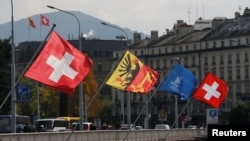The Swiss government plans to send parliament next year a broad new treaty with the European Union to replace a patchwork of bilateral deals now under strain from immigration, it said on Tuesday, but it faces stiff right-wing resistance.
Swiss voters have long been leery of ceding too much power to the 28-nation bloc that surrounds the historically neutral Alpine country and buys most of its exports, and rising EU immigration has stoked fears for Swiss identity and sovereignty.
Parliament is due next month to wrap up legislation meant to curb immigration from the EU by giving hiring preference to local people despite criticism this would infringe on the free movement of people, a pillar of EU policy and the price of enhanced Swiss access to the EU single market.
Brussels has taken a hard line on free movement of people to avoid encouraging Britain to believe it can obtain special terms as it negotiates its divorce from the EU after a June referendum vote to exit the bloc.
The government's 2017 legislative priorities included its proposal for the new treaty, which is opposed by the assembly's biggest faction, the far-right Swiss People's Party (SVP).
"Such an agreement will enable existing market accessaccords to be maintained and used more efficiently, as well as develop further the bilateral approach and conclude new market cooperation agreements between Switzerland and the EU," the federal cabinet said in a statement.
These could include accords on financial services and electricity that are missing in the current hodgepodge of around 120 deals.
Such a deal faces a tough fight.
Foreign Minister Didier Burkhalter has said that pushing through a new framework accord is politically impossible in Switzerland at the moment despite EU calls for such a treaty, most recently by German Chancellor Angela Merkel.
The SVP wants to put the plan to voters under the Swiss system of direct democracy. It insists that Swiss law must take precedence over most international law and rails against the idea of foreign judges telling Swiss what to do.
Diplomatic sources said that the new treaty gives the European Court of Justice a role in settling any disputes, whereas the Swiss see its rulings as non-binding.
The cabinet also intends to decide next year on renewing Swiss financial contributions to the EU budget, part of the price it pays for the access of Swiss businesses to the lucrative EU single market of 500 million consumers.
The upper house of parliament is due to address on Wednesday compromise legislation prompted by a 2014 binding referendum demanding upper limits and quotas for immigration to a country whose 8.3 million population is already a quarter foreign.
The local preference package stops well short of establishing quotas, but most politicians - with the exception of the SVP - want to avoid aggressive action to curb the influx of EU citizens that would invite a confrontation with Brussels.





